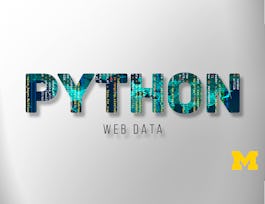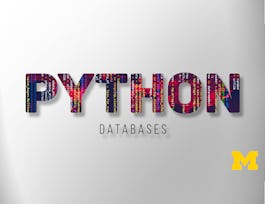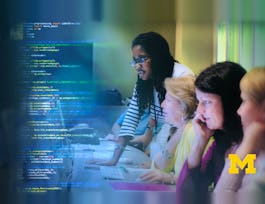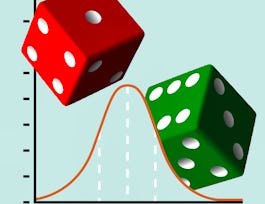This course will introduce the core data structures of the Python programming language. We will move past the basics of procedural programming and explore how we can use the Python built-in data structures such as lists, dictionaries, and tuples to perform increasingly complex data analysis. This course will cover Chapters 6-10 of the textbook “Python for Everybody”. This course covers Python 3.


Python Data Structures
This course is part of Python for Everybody Specialization
Taught in English
Some content may not be translated

Instructor: Charles Russell Severance
1,029,512 already enrolled
Included with 
Course
(94,750 reviews)
98%
What you'll learn
Explain the principles of data structures & how they are used
Create programs that are able to read and write data from files
Store data as key/value pairs using Python dictionaries
Accomplish multi-step tasks like sorting or looping using tuples
Skills you'll gain
Details to know

Add to your LinkedIn profile
5 quizzes
Course
(94,750 reviews)
98%
See how employees at top companies are mastering in-demand skills

Build your subject-matter expertise
- Learn new concepts from industry experts
- Gain a foundational understanding of a subject or tool
- Develop job-relevant skills with hands-on projects
- Earn a shareable career certificate


Earn a career certificate
Add this credential to your LinkedIn profile, resume, or CV
Share it on social media and in your performance review

There are 7 modules in this course
In this class, we pick up where we left off in the previous class, starting in Chapter 6 of the textbook and covering Strings and moving into data structures. The second week of this class is dedicated to getting Python installed if you want to actually run the applications on your desktop or laptop. If you choose not to install Python, you can just skip to the third week and get a head start.
What's included
7 videos7 readings1 quiz1 app item
In this module you will set things up so you can write Python programs. We do not require installation of Python for this class. You can write and test Python programs in the browser using the "Python Code Playground" in this lesson. Please read the "Using Python in this Class" material for details.
What's included
5 videos2 readings1 peer review1 app item
Up to now, we have been working with data that is read from the user or data in constants. But real programs process much larger amounts of data by reading and writing files on the secondary storage on your computer. In this chapter we start to write our first programs that read, scan, and process real data.
What's included
5 videos1 reading1 quiz2 app items
As we want to solve more complex problems in Python, we need more powerful variables. Up to now we have been using simple variables to store numbers or strings where we have a single value in a variable. Starting with lists we will store many values in a single variable using an indexing scheme to store, organize, and retrieve different values from within a single variable. We call these multi-valued variables "collections" or "data structures".
What's included
7 videos1 quiz2 app items
The Python dictionary is one of its most powerful data structures. Instead of representing values in a linear list, dictionaries store data as key / value pairs. Using key / value pairs gives us a simple in-memory "database" in a single Python variable.
What's included
7 videos1 quiz1 app item
Tuples are our third and final basic Python data structure. Tuples are a simple version of lists. We often use tuples in conjunction with dictionaries to accomplish multi-step tasks like sorting or looping through all of the data in a dictionary.
What's included
6 videos1 quiz1 app item
To celebrate your making it to the halfway point in our Python for Everybody Specialization, we welcome you to attend our online graduation ceremony. It is not very long, and it features a Commencement speaker and very short commencement speech.
What's included
2 videos2 readings
Instructor

Offered by
Recommended if you're interested in Software Development

University of Michigan

University of Michigan

University of Michigan

University of Zurich
Prepare for a degree
Taking this course by University of Michigan may provide you with a preview of the topics, materials and instructors in a related degree program which can help you decide if the topic or university is right for you.
Why people choose Coursera for their career




Learner reviews
Showing 3 of 94750
94,750 reviews
- 5 stars
87.64%
- 4 stars
11.21%
- 3 stars
0.89%
- 2 stars
0.13%
- 1 star
0.11%
New to Software Development? Start here.

Open new doors with Coursera Plus
Unlimited access to 7,000+ world-class courses, hands-on projects, and job-ready certificate programs - all included in your subscription
Advance your career with an online degree
Earn a degree from world-class universities - 100% online
Join over 3,400 global companies that choose Coursera for Business
Upskill your employees to excel in the digital economy
Frequently asked questions
Access to lectures and assignments depends on your type of enrollment. If you take a course in audit mode, you will be able to see most course materials for free. To access graded assignments and to earn a Certificate, you will need to purchase the Certificate experience, during or after your audit. If you don't see the audit option:
The course may not offer an audit option. You can try a Free Trial instead, or apply for Financial Aid.
The course may offer 'Full Course, No Certificate' instead. This option lets you see all course materials, submit required assessments, and get a final grade. This also means that you will not be able to purchase a Certificate experience.
When you enroll in the course, you get access to all of the courses in the Specialization, and you earn a certificate when you complete the work. Your electronic Certificate will be added to your Accomplishments page - from there, you can print your Certificate or add it to your LinkedIn profile. If you only want to read and view the course content, you can audit the course for free.
If you subscribed, you get a 7-day free trial during which you can cancel at no penalty. After that, we don’t give refunds, but you can cancel your subscription at any time. See our full refund policy.

